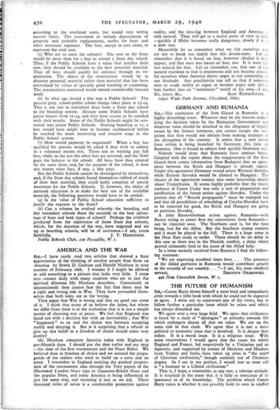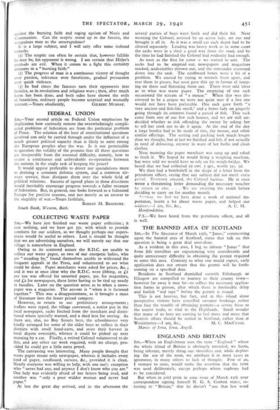THE FUTURE OF HUMANISM
SIR,—Canon Barry shows himself a most kind and sympathetic critic towards a little book with which he could not be expected to agree. I write not to controvert any of his views, but to follow further a particular issue which he raises and which has always disturbed me.
We agree over a very large field. We agree that civilisation is faced by a clash of "ideologies" or attitudes towards life which endangers almost all that we value. We are on the same side in that clash. We agree that it is not a mere political or economic issue that is involved. It is deeper than either. It is a moral issue. It is a religious issue. With some reservations I would agree that the cause for which England and France, led respectively by a Unitarian and an Agnostic, and supported by armies of Moslems and Hindoos from Turkey and India, have taken up arms is " the cause of Christian civilisation," though certainly not of Christian dogma. As I say in my preface, I would just as soon call it " a humane or a Liberal civilisation."
That is, I hope, a reasonable, at any rate, a tolerant attitude. It is sceptical in the sense that it is fully as conscious of its ignorance as of its knowledge. The problem which Canon Barry raises is whether it can possibly hold its own in conflict
against the burning faith and raging egoism of Nazis and Communists. Can the sceptic stand up to the fanatic, the scrupulous man to the unscrupulous?
It is a large subject, and I will only offer some isolated remarks.
(r) The sceptic can often be certain that, however fallible he may be, his opponent is wrong. I am certain that Hitler's methods are evil. _When it comes to a fight this certainty amounts to a " burning faith."
(2) The progress of man is a continuous victory of thought over passion, tolerance over fanaticism, gradual persuasion over quick violence.
(3) In bad times the fanatics turn their opponents into fanatics, as in revolutions and religious wars ; then, after much harm has been done, and both sides have shown the evils of fanaticism, ordinary people become sceptical and mutually



































 Previous page
Previous page